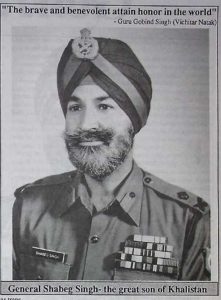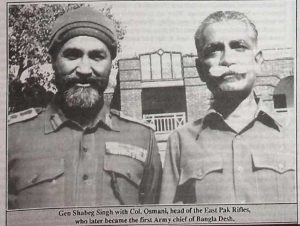

WSN Special By: Dr. G.S. Grewal
The Sikh nation, ever since the time of Guru Arjun Dev Jee has responded to the call of duty and resisted tyranny even at the cost of sacrificing their lives, Guru Arjun Dev Jee chose to sacrifice his life for the principles of Sikhism rather than hand over a sum of 25 lakh rupees demanded by Chandu Shah. Guru Tegh Bahadur sacrificed his life to uphold the rights of Brahmans to follow their religion and resist conversion by the fanatic emperor Aurangzeb. Guru Gobind Singh Jee sacrificed his whole family and himself to uphold the principle of Sikhism. Sikh history ever since has seen a succession of Martyrs who following the path of our Gurus, laid down their lives on the altars of the Sikh religion in an endeavor to keep it alive and Strong.
In this line of martyrs is included a humble, but brave and forthright man, who came from rustic village surroundings to become a general in the Indian Army his name was Shabeg Singh. Here is the story of a man, who, when the call for duty came, gave up all the thoughts he had for a peaceful retired life and died trying to serve his community.
General Shabeg Singh belonged to village Khiala, aboutnine miles from Amritsar on the Amritsar Chogwan Road, The eldest son of Sardar Bhagwan Singh and Pritam Kaur he had three brothers and a sister. The family traced its lineage to the great Sikh warrior, Bhai Mehtab Singh whoalongwith Bhai Sukha Singh slew the notorious Massa Rangar in 1740 and thus avenged the desecration of the Golden Temple. The family was welltodo and prosperous and had a good size land holding of over 100 acres. The village Khiala was earlier known as Khiala Nand Singhwala, Nand Singh was the great grandfather of Shabeg Singh, Later on the name got shortened to Khiala.
The mother of Shabeg Singh was A devout lady but she was very practical and a great disciplinarian. She never forgot to remind her children and grand children that they were the descendants of Baba Mehtab Singh and must live up to the family name. Sardar Bhagwan Singh was the village Lambardar and remained quite occupied with the problems of the village folk who always looked to him for guidance and depended greatly upon his advice.
In 1952, the younger brothers Sardar Shamsher Singh, Sardar Jaswant Singh alon gwith their brother in law shifted to Haldwani in the Terrararea of UP after having bought farmlands there. In 1957, S.Jaswant Singh died.
From his early childhood Shabeg, Singh displayed qualities of leadership and an intelligence much above that of the average village child. He was quick witted and often spontaneously composed extemporaneous verses to caricature interesting village personalities.
He displayed a keen interest in history and literature and his village teachers were impressed with his intellectual ability. They ad vised Sardar Bhagwan Singh and Pritam Kaur to send him to a school. He was sent to Khalsa College Amritsar for secondary education and from there to Govt College Lahore for higher education. Shabeg Singh had a natural ability an excelled in sports. He was an outstanding football and hockey player and excelled in athletics. At the age of 18 years he had equaled the India records in 100 m. sprint and was the District Broad jump champion. However, even though he had a natural ability for sports he did not wish to pursue that as a career, his mind was on the army which was considered a noble profession. He excelled in studies and generally topped his class. In 1940, an officer’s se lection team visiting Lahore colleges were looking for fresh recruits to the Indian Army Officers cadre. Out of a large number of students who applied, Shabeg Singh was the only one to be selected from Government College and sent for training in the Officer training school. After training he was commissioned in the second Punjab Regt as a Second Lieutenant, within a few days the Regt moved to Burma and joined the war against the Japanese which was then in progress. In 1944 when the war ended he was in Malaya with his unit. After partition, when re organization of the regiments took place, he joined the Parachute brigade as a Paratrooper, He was posted in the 1st para battalion in which he remained till 1959, At that time a new Gorkha Regiment was raised. Considered an outstanding officer he was transferred to the 11 Gorkhas to help raise new billions. Within one year of his joining the regiment he was speaking fluent Gorkhali and had mastered the psychology of the Gorkha soldier by extensive reading,
By nature Gen Shabeg was a voracious reader, he had read about every military campaign and knew the biography of every military general of consequence. He had a natural flair for history and loved reading. He could fluently speak Punjabi, Persian, Urdu, Gorkhali besides English and Hindi.
He was an instructor in the Military Academy at Dehra Dun and held a number of important staff appointments in various ranks. In the army he had a reputation of being a fearless officer and one who did not tolerate any nonsense. People either loved him or dreaded him because of his frank and forthright approach. During the course of his service in the Indian army, Shabeg Singh fought in every war that India participated in, In 1947, he was at Naushera in Jammu and Kashmir fighting against the Pakistan Army.
Whilst at Staff College, in addition to the academic work, he set a record in winning three, point to point and five flat races on horseback a record never equaled. Because of his knowledge of military science and excellent grasp of military operations he was appointed a Brigade Major after the staff course, As Brigade Major of 166 Infantry Brigade a crack formation, he felt most at home when the formation was out on military exercises.
In 1962 during the India China war, he was in North East Frontier Agency as a Lt Col in HQ four Corps where he was GSO1 (Intelligence). In the 1965 operations against Pakistan, he was in the Haji Pir Sector in Jammu and Kashmir, commanding a battalion of Gorkha troops. He com manded 3/11 Gorkha Rifles with distinction and was mentioned in dispatches for the capture of important enemy positions on the Haji Pir front.
A few days before the battalion was Lo be launched in to attack, the Commanding Officer (that time Lieutenant Colonel) Shabeg Singh received a telegram from his mother informing him that his father had expired, Being the eldest son his presence was required, However he quietly put the telegram in his pocket and no one in his battalion even knew that the commanding officer had lost his father on the eve of battle. Only when the operations were over, did he apply for leave and perform his duty of consoling his mother and family, His mother, Pritam Kaur, never asked why he had not been reached for performing the last rites, Everything was under stood the call of duty to defend the nation’s frontiers was of primary importance.
Soon after the 1965 operations, Shabeg became Col G.S. of an infantry division, alter which he was given command of the crack 19 Infantry brigade in Jammu sector, In 1969 when the Eastern sector of India was becoming deeply involved in Naga ant insurgency operations he was posted as Deputy GOC of the largest Indian Division eight Mountain Division which had nearly 50 thou sand troops under command. With his leadership qualities and employment of daredevil tactics he was greatly successful in handling the counterinsurgency operations in that region,
Mukhti Bahini
In 1971, when the political turmoil in East Pakistan (now Bangladesh) started and the Bengalis declared their intentions to separate, the Yahya Khan Govt cracked down on the Bengalis, forcing them to flee to neighbor though the Chief of Staff to Gen Sunderji the Army Commander in charge of the operation was yet given greater coverage by the Govt dominated media to show that the Army Sikh officers even at the highest level approved of the attack on the Golden Temple.
Maj Gen K.S.Brar, a Sikh only in name, clean shaven, marked to an angle Indian who smoked and drank and cared not for Sikhism, these two were orchestrated as the leaders of the attack.
Giani Zail Singh who signed the papers for army action was the President of the country, How clever of the ‘Pandityani’, She had everything all set.
On June 1 and June 2 Gen Brar himself went to assess the defenses of the temple dressed as a pilgrim and convinced his superiors that the operation would take only six hours.
On June 3 at 9:30 a.m, Punjab, Amritsar was scaled off and no movement of people allowed into the Golden Temple or out of it. At 9:30 a.m, that day Gen Shabeg Singh had literally forced his mother, wife, sister-in-law and nephew to leave the complex and go to the village. They had come there to offer prayers on the Shaheedi Gurupurub of Guru Arjun Dev Singh which fell on June4 and make arrangements for the annual “Chownki’ which proceeds from Harmandir Sahib to Gurusar the Gurdwara of guru Hargobind Sahib. The Chownki (party carrying the Guru Granth Sahib) halisat village Khiala which is on the way, Soft drinks, to a and snacks are served to everyone and this duly had been performed by Pritam Kaur, General Shabeg Singh’s mother since many, many years. Even if she was alone, she made sure arrangements for the Chownki’s were made by the village folks. At Harmandir Sahib, thousands of pilgrims who had come for the annual occasion, could not leave before 9:30 a.m. and were rapped, many thousands would lose their lives in the massacre that was about to be unleashed by the power hungry Indira and her stooges. Sikhs would be presented with another group of martyrs.
The last chapter in the lives of SantJarnail Singh Bhindranwale, Bhai Amrik Singhand Gen Shabeg Singh along with those valiant youth who fought for the honor of Golden Temple and the Sikhs was about to close. So too would be lost the lives of thousands of innocent pilgrims while those spared would rot in camps and prisons of the Indian Govt for many years.
Yet a new chapter in the history of the Sikhs was about to begin. Ever since Blue Star, tens of thousands of Sikh youth have lost their lives in the struggle to achieve Khalistan, a land which the Sikhs can call their awn. A place where they will be the masters of their destiny and not be exploited by any unscrupulous and power hungry Hindu politician like Indira or Rajiv. Sikhs cannot rest until they have our own homeland where coming generations of Sikhs can enjoy the fruits of liberty and pursue happiness in a democratic society.
The sacrifices of those tens of thousands shall not be allowed to be in vain, By the Grace of Waheguru the Sikh phoenix will rise from its ashes to soar higher. That day shall not be too faraway when the blood of our martyrs shall bear fruit.
(Copy right of World Sikh News)
Article extracted from this publication >> June 4, 1993